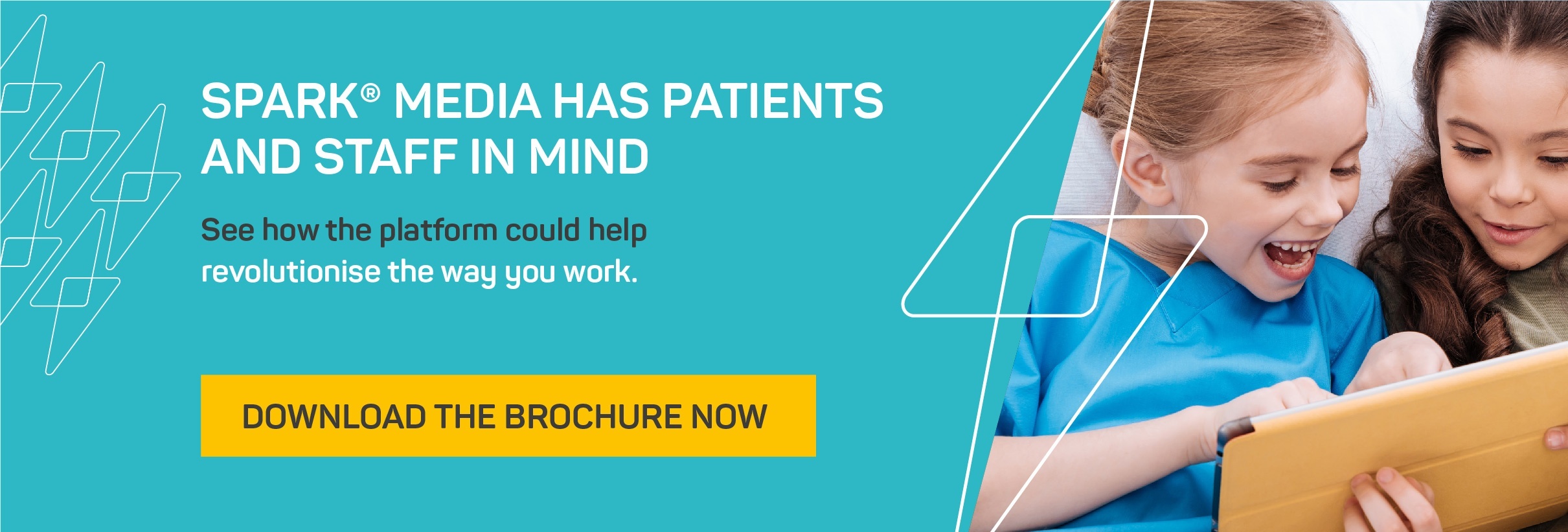How an Efficient Hospital Patient Engagement System Helps Everyone Involved
5 minute read | 16/02/2024

Medical and admin staff have to balance huge workloads. From organising medical records to checking patients into their appointments and helping them with their complicated ailments and health conditions, NHS staff manage all of this and yet they do so with a smile. An efficient hospital patient engagement system can help relieve some of this workload. Here’s how.
- Better Resource and Financial Management
- Prevents Ad Hoc Patient Requests from Disrupting Staff Productivity
- Integrated Opportunities for Feedback
- Vital Information Can Easily be Accessed by Both Staff and Patients
- Entertainment Features to Boost Patient Experience
Better Resource and Financial Management
An efficient hospital patient engagement system can help Trusts with resource allocation. For example, integrating with the Trust’s meal ordering provider can reduce food wastage. Between 2011 and 2012, the NHS was accused of wasting £27 million on uneaten food. The worst Trusts saw more than a quarter of the meals they served returned. It’s vital that the NHS reduces wastage if it’s to save money.
Hospital meals can be wasted for a variety of reasons. For instance, patients with dietary requirements might order a meal and then find out when it comes that it contains ingredients they can’t eat, which leads to a wasted meal. Or, a meal might be ordered to a specific bed and then the patient has to be moved to another ward. This can lead to a meal being delivered to the wrong patient and thus, is another wasted meal.
A hospital patient engagement system can be linked to individual patients and their bed and ward number so when they move, the meal can be redirected to them. The electronic menu will also clearly state the ingredients so patients are aware of a meal’s contents before they order.
A meal ordering feature can also help reduce errors and delays. Traditionally, patients would have to fill out a meal card which ward staff would collect. These cards can easily be misplaced which can lead to delayed meal times.
A patient engagement system with an integrated meal ordering feature allows patients to order their meals from a mobile device. Not only is this much harder to misplace than a paper meal card, but it’s also more accurate - especially for patients with specific dietary needs.
Prevents Ad Hoc Patient Requests from Disrupting Staff Productivity
Patient requests, such as asking for an extra pillow or glass of water, can often disrupt staff productivity as the nurse has to stop what they’re doing in order to tend to that request. A hospital engagement system can help with that. The platform contains a “service request” feature where patients can ask for whatever they need and this request can then be picked up by the correct member of staff.
By seeing that the right hospital staff member deals with these non-medical issues, Trusts can ensure the productivity of their other team members isn’t affected - and neither is the quality of their hospital’s healthcare.
Integrated Opportunities for Feedback
Feedback is extremely valuable for Trusts as it allows them to keep improving the quality of their service. However, it’s too easy for patients and visitors to forget to take the surveys or ignore reminders for it all together.
An engagement system can offer integrated opportunities for feedback as an option on the platform’s homepage. This way, patients and visitors are much less likely to forget to take the survey as it is displayed on the device they’re using. Or, they might be more willing as the survey is integrated into the platform - it’s more convenient as they can use a device they are familiar with in order to take the survey.
Vital Information Can Easily be Accessed by Both Staff and Patients
A hospital patient management system stores and presents all the information both staff and patients might want to access.
For example, healthcare professionals can show information related to the patient's care via this platform (using a Trust-owned device) as it can provide a digital window to the medical practitioners’ medical files. They no longer need to ask a member of staff who, in turn, no longer needs to go and find this information.
Instead, the information will be stored electronically via the system. Not only is this much easier to visually process, it will be much quicker for medical staff to find and stay organised. This ensures a hospital maintains maximum productivity.
Entertainment Features to Boost Patient Experience
Many patients can feel “cut off” from the outside world when they’re in hospital. This is largely because a patient’s family has to balance their work and social life with the designated visiting hours. In addition, because most hospitals have poor cellular signal, it can be difficult for patients to stay in contact with their loved ones. This can lead to them feeling isolated and lonely - particularly if they’re spending days, weeks or even longer recovering in a ward.
WiFi can help patients stay connected to the outside world by allowing them to access instant message chats, emails and video calls - like at home. This can help to boost the patient experience. But, patient engagement platforms can help boost this even more.
Digital patient engagement platforms, like SPARKⓇ Media, offer entertainment and education rolled onto a clinical platform. This allows patients to watch live TV, stream videos on demand, listen to the radio, access extra channels such as Sky Sports and more on the device of their choosing. This helps keep patients entertained and occupied, passing the time quicker so boosting their mood and experience in the hospital.
A happy patient doesn’t just indicate a hospital did its job. It also means a more cooperative patient who is willing to participate in feedback surveys and is less likely to cause staff problems, so a hospital can keep improving the quality of their service and help the patient get the healthcare they need.
Engagement Systems Can Help Hospitals Deliver Better Quality Healthcare. Here’s Where to Find Out More
A hospital patient management system can transform the way the NHS delivers its healthcare services. Currently, many patients are unhappy with the service and quality of care they receive, the root of which is dedicated staff being stretched too thin.
From delayed appointments to handwritten prescription errors, a medical practitioner’s hectic schedule can result in patient dissatisfaction. There’s a huge need for the administrative tasks to become more streamlined and patients to be more self sufficient during their stay. Systems such as SPARKⓇ Media can help.
If you’d like to find out more on how hospital engagement and patient infotainment systems can benefit the NHS, download a free copy of our SPARKⓇ Media brochure below.
About the author
Rebecca O'Donovan
Becky is the Marketing Director at SPARK TSL, of whom she has worked for since 2012. She is responsible for high-level marketing strategy focusing on lead generation and aiding the vision of the business to ensure business growth.
More articles by the author
Related articles
 The SPARK Solution
The SPARK Solution
Analysing NHS Winter Pressures and Exploring Possible Solutions
As winter gradually creeps towards us, it’s time to face the reality of all the challenges the season can ...
 Healthcare Industry
Healthcare Industry
Why Should Healthcare be WiFi enabled? | SPARK TSL
It’s a secure, stable and consistent service that allows the public to browse the internet and download apps. ...
 Healthcare Industry
Healthcare Industry
What's Next in Hospital Patient Entertainment Systems? | SPARK TSL
When hospitals started to offer television in the early 2000s, the government saw it as a triumphant drive ...


